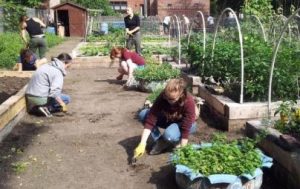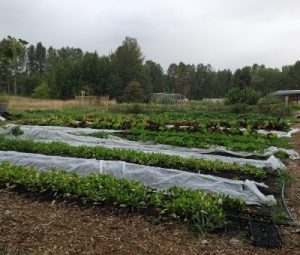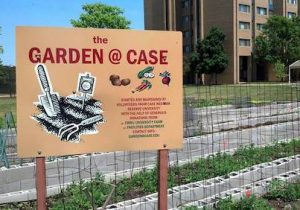In recent years, unused land on campuses scattered across the US has been turned into sustainable university gardens that produce organic fruits and vegetables. Not surprising, given the developing importance of super fresh, locally grown food, urban farming, and community engagement.
Harvard University
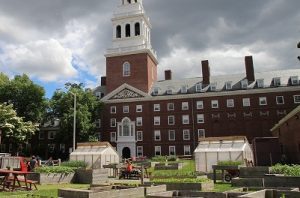 Created in 2009 by an undergrad group, the Student Garden Club manages and maintains the university garden and greenhouses that operate from early spring through fall. Not one root, shoot, leaf or fruit goes to waste in their quest to grow food and build community. Harvard Community Garden harvests are used in campus dining services, sold at the Harvard Farm Market, and they make weekly donations to the local Faith Kitchen and Food For Free.
Created in 2009 by an undergrad group, the Student Garden Club manages and maintains the university garden and greenhouses that operate from early spring through fall. Not one root, shoot, leaf or fruit goes to waste in their quest to grow food and build community. Harvard Community Garden harvests are used in campus dining services, sold at the Harvard Farm Market, and they make weekly donations to the local Faith Kitchen and Food For Free.
More Info: City Farmer (image source) and Harvard’s garden pages.
Loyola University Chicago
The Urban Ag program through the Institute of Environmental Stability at this midwestern university gardens to learn about growing sustainable food and building local food systems. They raise organic crops outdoors in 3 different gardens, have aquaponic systems, and a greenhouse. The student growers provide their community with the freshest healthy foods through the Loyola Farmers’ Market. Each year they donate hundreds of pounds of their harvest – over 20% of what they grow – to local food pantries.
More Info: LUC IES and LUC Sustainable Food (image)
University of Washington
A year after the UW Botanical Garden was founded, some staff and students created three veggie beds outside the Botany Greenhouse. Others got involved, cropping space expanded, and over the course of 11 years the university gardens have grown to cover 1.5 acres of the Seattle campus. Not only does the urban farm donate almost a ton of produce to the University District Food Bank each year, they launched a Campus Food Pantry in 2016 to give students and staff struggling financially the chance to eat healthier regularly.
More Info: UW Farm gardens and Swanson Nursery (image source)
Yale University
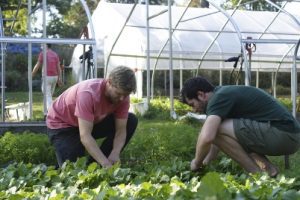 When they say that the university gardens came to life in a forgotten corner of the Farnam Memorial Gardens, your mind’s eye pictures a small plot jam-packed with intensive cropping. However, the Yale Farm is a full acre, lushly pumping out fruit, vegetables, fresh eggs, and honey through all seasons. It’s part of the Yale Sustainable Food Program. The harvest is shared by volunteers and students, donated to local food pantries, and sold at market or to area chefs. Started in 2003, it’s a main campus social hub and incorporated into the classroom too. Recently, they started the second garden on the West Campus.
When they say that the university gardens came to life in a forgotten corner of the Farnam Memorial Gardens, your mind’s eye pictures a small plot jam-packed with intensive cropping. However, the Yale Farm is a full acre, lushly pumping out fruit, vegetables, fresh eggs, and honey through all seasons. It’s part of the Yale Sustainable Food Program. The harvest is shared by volunteers and students, donated to local food pantries, and sold at market or to area chefs. Started in 2003, it’s a main campus social hub and incorporated into the classroom too. Recently, they started the second garden on the West Campus.
More Info: Yale Farm page one and page 2 (image source)
Case Western Reserve University
Local food is important to at Case Western. And while Ohio is an agricultural mecca, their Office for Sustainability works to provide everyone on campus with the freshest sustainable food and educate the community at the same time. They have 2 off-campus farms producing food served on campus and filling CSA boxes, but the university gardens for the needy too. Their Garden@Case is a community garden where 100% of the harvest is shared by volunteers and donated to relieve hunger. The majority of what they grow here is given to the local Cory Hunger Center.
More Info: CWRU Localizing Food and Garden@Case (image source)
Only 5 Such University Gardens?
It appears the list is this short. At least, these were the only search results found where a school organization or office is directly involved in making their community more sustainable by giving part of the harvest to hunger relief. There might be more and it’s an important aspect of their urban agriculture that simply hasn’t become a news item or been added to their web pages yet.
Featured image courtesy of Loyola University Chicago.
